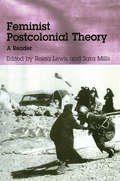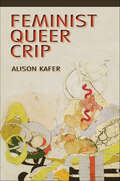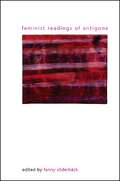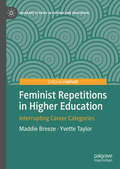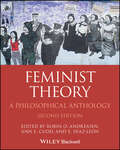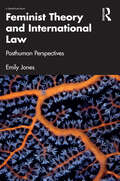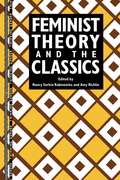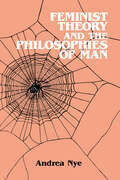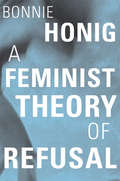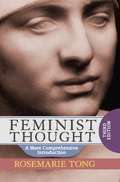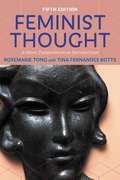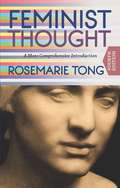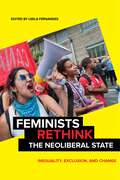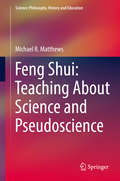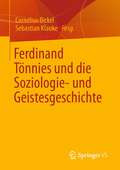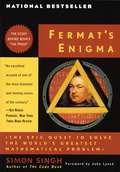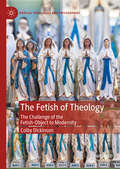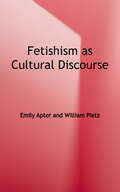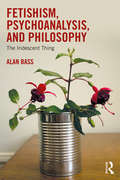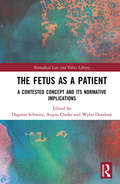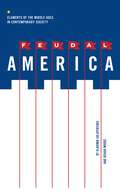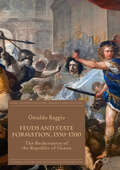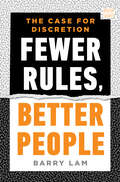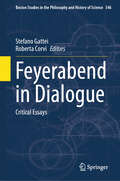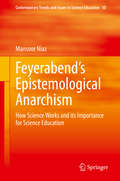- Table View
- List View
Feminist Postcolonial Theory: A Reader
by Reina Lewis Sara MillsFeminism and postcolonialism are allies, and the impressive selection of writings brought together in this volume demonstrate how fruitful that alliance can be. Reina Lewis and Sara Mills have assembled a brilliant selection of thinkers, organizing them into six categories: "Gendering Colonialism and Postcolonialism/Radicalizing Feminism," "Rethink
Feminist, Queer, Crip
by Alison KaferIn Feminist, Queer, Crip Alison Kafer imagines a different future for disability and disabled bodies. Challenging the ways in which ideas about the future and time have been deployed in the service of compulsory able-bodiedness and able-mindedness, Kafer rejects the idea of disability as a pre-determined limit. She juxtaposes theories, movements, and identities such as environmental justice, reproductive justice, cyborg theory, transgender politics, and disability that are typically discussed in isolation and envisions new possibilities for crip futures and feminist/queer/crip alliances. This bold book goes against the grain of normalization and promotes a political framework for a more just world.
Feminist Readings of Antigone (SUNY series in Gender Theory)
by Fanny SöderbäckFeminist Readings of Antigone collects the most interesting and provocative feminist work on the figure of Antigone, in particular looking at how she can figure into contemporary debates on the role of women in society. Contributors focus on female subjectivity and sexuality, feminist ethics and politics, questions of race and gender, psychoanalytic theory, kinship, embodiment, and tensions between the private and the public. This collection seeks to explore and spark debate about why Antigone has become such an important figure for feminist thinkers of our time, what we can learn from her, whether a feminist politics turning to this ancient heroine can be progressive or is bound to idealize the past, and why Antigone keeps entering the stage in times of political crisis and struggle in all corners of the world. Fanny Söderbäck has gathered classic work in this field alongside newly written pieces by some of the most important voices in contemporary feminist philosophy. The volume includes essays by Judith Butler, Adriana Cavarero, Tina Chanter, Luce Irigaray, and Julia Kristeva.
Feminist Repetitions in Higher Education: Interrupting Career Categories (Palgrave Studies in Gender and Education)
by Maddie Breeze Yvette TaylorTo do feminism and to be a feminist in higher education is to repeat oneself: to insist on gender equality as more than institutional incorporation and diversity auditing, to insert oneself into and against neoliberal measures, and to argue for nuanced intersectional feminist analysis and action. This book returns to established feminist strategies for taking up academic space, re-thinking how feminists inhabit the university and pushing back against institutional failures. The authors assert the academic career course as fundamental to understanding how feminist educational journeys, collaborations and cares and ways of knowing stretch across and reconstitute academic hierarchies, collectivising and politicising feminist career successes and failures. By prioritising interruptions, the book navigates through feminist methods of researcher reflexivity, autoethnography and collective biography: in doing so, moving from feminist identity to feminist practice and repeating the potential of queer feminist interruptions to the university and ourselves.
Feminist Theory: A Philosophical Anthology (Blackwell Philosophy Anthologies)
by Robin O. Andreasen Ann E. Cudd E. Díaz‐LeónBringing together influential voices and groundbreaking new essays, Feminist Theory: A Philosophical Anthology examines the key questions at the heart of feminist philosophy through a clear structure and accessible yet rigorous content. This carefully curated selection of classic and contemporary essays emphasizes the flourishing growth of feminist thought over time, ranging from foundational texts by Simone de Beauvoir, Judith Butler, and Kimberlé Crenshaw, to new essays by contemporary scholars like Kate Manne, Talia Mae Bettcher, and Robin Dembroff. This edition expands on the original with fresh scholarship and a broader range of perspectives on gender, identity, knowledge, production and justice. New essays address intersectionality, gender identity, the critique of ideal theory, feminist critiques of traditional ethics, the impact of social norms on autonomy and epistemic injustice, and much more. Including critiques of traditional philosophical frameworks and self-reflection of feminism itself, this essential collection highlights how feminist theory shapes and challenges our current understanding of society. Designed for students and scholars in philosophy, gender studies, and social theory, Feminist Theory: A Philosophical Anthology is ideal for students taking courses in feminist philosophy and feminist theory, educators in social sciences and humanities, and activists and professionals seeking a nuanced understanding of feminist philosophy.
Feminist Theory and International Law: Posthuman Perspectives
by Emily JonesFeminist approaches to international law have been mischaracterised by the mainstream of the discipline as being a niche field that pertains only to women’s lived experiences and their participation in decision-making processes. Exemplifying how feminist approaches can be used to analyse all areas of international law, this book applies posthuman feminist theory to examine the regulation of new and emerging military technologies, international environmental law and the conceptualisation of the sovereign state and other modes of legal personality in international law. Noting that most posthuman scholarship to date is primarily theoretical, this book also contributes to the field of posthumanism through its application of posthuman feminism to international law, working to bridge the theory and practice divide by using posthuman feminism to design and call for legal change. This interdisciplinary book draws on an array of fields, including philosophy, queer and feminist theories, postcolonial and critical race theories, computer science, critical disability studies, science and technology studies, marine biology, cultural and media studies, Indigenous onto-epistemologies, critical legal theory, political science and beyond to provide a holistic analysis of international law and its inclusions and exclusions. This interdisciplinary book will appeal to students and scholars with interests in legal, feminist and posthuman theory, as well as those concerned with the contemporary challenges faced by international law.
Feminist Theory and the Classics (Thinking Gender)
by Nancy Sorkin Rabinowitz Amy RichlinFirst published in 1993. Routledge is an imprint of Taylor & Francis, an informa company.
Feminist Theory and the Philosophies of Man
by Andrea NyeFirst published in 1990. Routledge is an imprint of Taylor & Francis, an informa company.
A Feminist Theory of Refusal
by Bonnie HonigAn acclaimed political theorist offers a fresh, interdisciplinary analysis of the politics of refusal, highlighting the promise of a feminist politics that does not simply withdraw from the status quo but also transforms it. The Bacchae, Euripides’s fifth-century tragedy, famously depicts the wine god Dionysus and the women who follow him as indolent, drunken, mad. But Bonnie Honig sees the women differently. They reject work, not out of laziness, but because they have had enough of women’s routine obedience. Later they escape prison, leave the city of Thebes, explore alternative lifestyles, kill the king, and then return to claim the city. Their “arc of refusal,” Honig argues, can inspire a new feminist politics of refusal. Refusal, the withdrawal from unjust political and economic systems, is a key theme in political philosophy. Its best-known literary avatar is Herman Melville’s Bartleby, whose response to every request is, “I prefer not to.” A feminist politics of refusal, by contrast, cannot simply decline to participate in the machinations of power. Honig argues that a feminist refusal aims at transformation and, ultimately, self-governance. Withdrawal is a first step, not the end game. Rethinking the concepts of refusal in the work of Giorgio Agamben, Adriana Cavarero, and Saidiya Hartman, Honig places collective efforts toward self-governance at refusal’s core and, in doing so, invigorates discourse on civil and uncivil disobedience. She seeks new protagonists in film, art, and in historical and fictional figures including Sophocles’s Antigone, Ovid’s Procne, Charlie Chaplin’s Tramp, Leonardo da Vinci’s Madonna, and Muhammad Ali. Rather than decline the corruptions of politics, these agents of refusal join the women of Thebes first in saying no and then in risking to undertake transformative action.
Feminist Thought
by Rosemarie TongA clear, comprehensive, and indispensable introduction to the major traditions of feminist theory, Feminist Thought includes incisive, critical examinations of liberal feminism, radical feminism, Marxist and socialist feminism, and ecofeminism.<P><P> This third edition has been thoroughly reformulated and expanded to include the latest developments in feminist thought, including a new chapter on care-focused feminism (Chapter 5), an exploration of the connections of multicultural and global feminism with postcolonial feminism (Chapter 6), and a close consideration of the links between postmodern feminism and third-wave feminism (Chapter 8). Key feminist theorists such as Judith Butler, Martha Nussbaum, and Eva Feder Kittay receive new or extended discussions. The bibliography, organized by topics within chapters, provides an invaluable aid to further research. An illuminating guide to the diversity of feminism, Feminist Thought continues to serve as the essential resource for students and thinkers who want to understand the theoretical origins and complexities of contemporary feminist debates. Contents Introduction; The Diversity of Feminist Thinking 1. Liberal Feminism 2. Radical Feminism; Libertarian and Cultural Perspectives 3. Marxist and Socialist Feminism; Classical and Contemporary 4. Psychoanalytic Feminism 5. Care-focused Feminism 6. Multicultural, Global, and Postcolonial Feminism 7. Ecofeminism 8. Postmodern and Third-wave Feminism Conclusion; Margins and Centers This edition is in two volumes. The first volume ISBN is 9781458781574.
Feminist Thought: A More Comprehensive Introduction
by Rosemarie Tong Tina Fernandes BottsA classic resource on feminist theory, Feminist Thought offers a clear, comprehensive, and incisive introduction to the major traditions of feminist theory, from liberal feminism, radical feminism, and Marxist and socialist feminism to care-focused feminism, psychoanalytic feminism, and ecofeminism. The fifth edition has been thoroughly revised, and now includes a new chapter on Third Wave and Third Space Feminism. Also added to this edition are significantly expanded discussions on women of color feminisms, psychoanalytic and care feminisms, as well as new examinations of queer theory, LGBTQ and trans feminism.Learning tools like end-of-chapter discussion questions and the bibliography make Feminist Thought an essential resource for students and thinkers who want to understand the theoretical origins and complexities of contemporary feminist debates.
Feminist Thought
by Rosemarie Putnam TongFeminist Thought offers a clear, comprehensive, and incisive introduction to the major traditions of feminist theory, from liberal feminism, radical feminism, and Marxist and socialist feminism to care-focused feminism, psychoanalytic feminism, and ecofeminism. The fourth edition has been thoroughly revised and expanded, including a new section on existentialism as it relates to postmodern feminism in Chapter 5, and a new conclusion that contemplates third-wave feminism and the future directions of feminist theory. Chapter 6 on women of color feminisms was also significantly revised and expanded by Tina Fernandes of the University of North Carolina at Charlotte. Learning tools like the new end-of-chapter discussion questions, and the bibliography, organized by topics within chapters, make Feminist Thought an essential resource for students and thinkers who want to understand the theoretical origins and complexities of contemporary feminist debates.
Feminists Rethink the Neoliberal State: Inequality, Exclusion, and Change
by Leela FernandesA rich set of feminist perspectives on the varied and often contradictory nature of state practices, structures, and ideologies Growing socio-economic inequality and exclusion are defining features of the twenty-first century. While debates on globalization, free trade, and economic development have been linked to the paradigm of “neo-liberalism,” it does not explain all the forms of social change that have been unfolding in comparative contexts. Feminists Rethink the Neoliberal State provides a timely intervention into discussions about the boundaries, practices, and nature of the post-liberalization state, suggesting that an understanding of economic policies, the corresponding rise of socio-economic inequality, and the possibilities for change requires an in-depth reconceptualization.Drawing on original field research both globally and within the United States, this volume brings together a rich set of perspectives on the varied and often contradictory nature of state practices, structures and ideologies in the post-liberalization era. The essays develop an interdisciplinary approach that treats an understanding of historically-specific forms of inequality—such as gender, race, caste, sexuality and class—as integral to, rather than as after-effects of, the policies and ideologies associated with the “neoliberal project.” The volume also tackles central questions on the restructuring of the state, the state’s power operations, the relationship between capital and the state, and its interactions with the institutions and organizational forms of civil society in the post-liberalization era. As such, Feminists Rethink the Neoliberal State examines both what is distinctive about this post-liberalization state and what must be contextualized as long-standing features of modern state power. A truly international and interdisciplinary volume, Feminists Rethink the Neoliberal State deepens our understanding of how policies of economic liberalization shape and produce various forms of inequality.
Feng Shui: Teaching About Science and Pseudoscience (Science: Philosophy, History and Education)
by Michael R. MatthewsThis book provides a richly documented account of the historical, cultural, philosophical and practical dimensions of feng shui. It argues that where feng shui is entrenched educational systems have a responsibility to examine its claims, and that this examination provides opportunities for students to better learn about the key features of the nature of science, the demarcation of science and non-science, the characteristics of pseudoscience, and the engagement of science with culture and worldviews. The arguments presented for feng shui being a pseudoscience can be marshalled when considering a whole range of comparable beliefs and the educational benefit of their appraisal.Feng shui is a deeply-entrenched, three-millennia-old system of Asian beliefs and practices about nature, architecture, health, and divination that has garnered a growing presence outside of Asia. It is part of a comprehensive and ancient worldview built around belief in chi (qi) the putative universal energy or life-force that animates all existence, the cosmos, the solar system, the earth, and human bodies. Harmonious living requires building in accord with local chi streams; good health requires replenishment and manipulation of internal chi flow; and a beneficent afterlife is enhanced when buried in conformity with chi directions. Traditional Chinese Medicine is based on the proper manipulation of internal chi by acupuncture, tai-chi and qigong exercise, and herbal dietary supplements. Matthews has produced another tour de force that will repay close study by students, scientists, and all those concerned to understand science, culture, and the science/culture nexus.Harvey Siegel, Philosophy, University of Miami, USA With great erudition and even greater fluidity of style, Matthews introduces us to this now-world-wide belief system.Michael Ruse, Philosophy, Florida State University, USA The book is one of the best research works published on Feng Shui. Wang Youjun, Philosophy, Shanghai Normal University, China The history is fascinating. The analysis makes an important contribution to science literature.James Alcock, Psychology, York University, Canada This book provides an in-depth study of Feng Shui in different periods, considering its philosophical, historical and educational dimensions; especially from a perspective of the ‘demarcation problem’ between science and pseudoscience. Yao Dazhi, Chinese Academy of Sciences, China
Ferdinand Tönnies und die Soziologie- und Geistesgeschichte
by Cornelius Bickel Sebastian KlaukeDer Band beleuchtet das Schaffen von Ferdinand Tönnies in Bezug auf die geistes- und sozialgeschichtlichen Kontexte seiner Zeit. Tönnies erweist sich als über die Grenzen der Soziologie hinaus relevant.
Fermat's Enigma: The Epic Quest to Solve the World's Greatest Mathematical Problem
by Simon Singhxn + yn = zn, where n represents 3, 4, 5, ...no solution"I have discovered a truly marvelous demonstration of this proposition which this margin is too narrow to contain."With these words, the seventeenth-century French mathematician Pierre de Fermat threw down the gauntlet to future generations. What came to be known as Fermat's Last Theorem looked simple; proving it, however, became the Holy Grail of mathematics, baffling its finest minds for more than 350 years. In Fermat's Enigma--based on the author's award-winning documentary film, which aired on PBS's "Nova"--Simon Singh tells the astonishingly entertaining story of the pursuit of that grail, and the lives that were devoted to, sacrificed for, and saved by it. Here is a mesmerizing tale of heartbreak and mastery that will forever change your feelings about mathematics.
The Fetish of Theology: The Challenge of the Fetish-Object to Modernity (Radical Theologies and Philosophies)
by Colby DickinsonBy delving into the history of the fetish-object among both modern and contemporary commentators, this book highlights the fetish-object’s role as a philosophical and religious concept of the highest significance. Historically, fetishes are implicated in specific struggles for sovereign (political) and/or religious (hierarchical) power, with their interwoven symbols defined as the primary location for transcendence in our world. This book defines the political consequences of fetish-objects within a western cultural, and primarily theological context through a comparative approach of various literatures on fetish-objects—anthropological to the psychological, Marxist to the theological. It reconceives of fetishes as a form of resistance to oppressive structures, something which motivated Christians themselves historically, and shaped our western understanding of the sacraments far more than has been acknowledged. Taking up this conversation likewise holds forth the possibility of reconceptualizing how fetish-objects and sacramental presences both speak profoundly to our late-modern selves.
Fetishism As Cultural Discourse
by Emily Apter William PietzFetishism is a term widely disseminated in literary and cultural studies. It carries a variety of generic meanings. Most of these derive to some degree from Marxist and psychoanalytic discourses, where the term fetishism has technical significance. This book will engage and challenge a wide audience of academic and nonacademic readers, including specialists and students in the fields of anthropology, history, literature, film, psychoanalysis, visual arts, feminist theory, Marxian criticism, and cultural studies.
Fetishism, Psychoanalysis, and Philosophy: The Iridescent Thing
by Alan BassFetishism, Psychoanalysis, and Philosophy explores how and why Freud’s late work on fetishism led to the beginnings of a re-formulation of the theory and practice of psychoanalysis. Freud himself, however, was unaware of the long history of the concept of fetishism, a history crucial to understanding the concept. This book contains three main thrusts. One is historical, tracing the development of the concept of fetishism from the 16th century onwards. The focus here is on two important thinkers: Charles de Brosses from the 18th century, and Auguste Comte from the 19th. The second thrust is philosophical. Fetishism is always about the relation between the mind and things. Martin Heidegger, Jaques Derrida, and Maurice Merleau-Ponty have made essential contributions in this area, contributions which have important scientific relevance. The third thrust integrate the historical, philosophical, and psychoanalytic investigations of fetishism. It also looks at Wallace Stevens’ poetic meditation on mind and thing, which helps to illuminate everything that precedes. This comprehensive book features careful integration of the historical, philosophical, and psychoanalytic investigations of fetishism. It will contribute to opening new ways of thinking about the mind and how it is structured, so that fetishism is possible. Fetishism, Psychoanalysis, and Philosophy will appeal to psychoanalysts and psychoanalytic psychotherapists as well as philosophy scholars.
The Fetus as a Patient: A Contested Concept and its Normative Implications (Biomedical Law and Ethics Library)
by Dagmar Schmitz Angus Clarke Wybo DondorpDue to new developments in prenatal testing and therapy the fetus is increasingly visible, examinable and treatable in prenatal care. Accordingly, physicians tend to perceive the fetus as a patient and understand themselves as having certain professional duties towards it. However, it is far from clear what it means to speak of a patient in this connection. This volume explores the usefulness and limitations of the concept of ‘fetal patient’ against the background of the recent seminal developments in prenatal or fetal medicine. It does so from an interdisciplinary and international perspective. Featuring internationally recognized experts in the field, the book discusses the normative implications of the concept of ‘fetal patient’ from a philosophical-theoretical as well as from a legal perspective. This includes its implications for the autonomy of the pregnant woman as well as its consequences for physician-patient-interactions in prenatal medicine.
Feudal America: Elements of the Middle Ages in Contemporary Society
by Vladimir Shlapentokh Joshua WoodsDo Americans live in a liberal capitalist society, where evenhanded competition rules the day, or a society in which big money, private security, and personal relations determine key social outcomes? Vladimir Shlapentokh and Joshua Woods argue that the answer to these questions cannot be found among the conventional models used to describe the nation. Offering a new analytical tool, the authors present a provocative explanation of the nature of contemporary society by comparing its essential characteristics to those of medieval European societies. Their feudal model emphasizes five elements: the weakness of the state and its inability to protect its territory, guarantee the security of its citizens, and enforce laws; conflicts and collusions between and within organizations that involve corruption and other forms of illegal or semilegal actions; the dominance of personal relations in political and economic life; the prevalence of an elitist ideology; and the use of private agents and organizations for the provision of safety and security. Feudal America urges readers to suspend their forward-thinking and futurist orientations, question linear notions of social and historical progression, and look for explanations of contemporary social problems in medieval European history.
Feuds and State Formation, 1550–1700: The Backcountry of the Republic of Genoa (Early Modern History: Society and Culture)
by Osvaldo RaggioThis book re-evaluates the role of local agency and provides a new perspective to the political, social and cultural history of state formation, taking a microhistorical approach and through close analysis of archival sources between 1550 to 1700. The backcountry of the Republic of Genoa is a laboratory for gauging the weight and significance of two elements which, according to Charles Tilly and other scholars, have characterized the construction of the modern state: judicial administration and fiscal extraction. The instruments employed in this respect were arbitration and compensation. Interactions between center and periphery occurred within a stratified and discontinuous fabric of fluid jurisdictions and segmented residential topographies, which constituted spaces of mediation. Such spaces were generated by conflicts between kin groups (feuds and factional alignments) and managed both by Genoese officials and by local notables and notaries, who translated a whole set of local practices into judicial procedures. This book offers a rich contextualization of material life, family relationships, economic activities, and power struggles in a corner of the Mediterranean world that was extremely important, but about which very little has been published in English.
Fewer Rules, Better People: The Case for Discretion (A Norton Short)
by Barry LamA philosopher argues that the proliferation of rules and mandates is making us dumber, less moral, more deceptive, and less able to govern important institutions. Wherever there’s a rule, there is someone with the power to apply or ignore it—or add to it, in the interest of justice. From enforcing chores to issuing life sentences, decision-makers deliver flawed and sometimes arbitrary outcomes. But is their use of discretion good or bad overall? As a society, should we seek to minimize or maximize discretion, with all its potential for bias and other kinds of human error? Reframing our understanding of justice and ethics, philosopher Barry Lam argues that while use of discretion—whether by a sports referee, a parent, a police officer, or a judge—can never be perfect, removing it has even more problematic effects. Mandatory arrests and sentencing laws have not eliminated bias, but have corrupted the courtroom, institutionalized lying, and brought about even more unjust and arbitrary results. Fewer Rules, Better People is a bold, riveting treatise that sheds new light on political debates about law and justice while aiming to prepare us for the imminent threat of more “perfect,” discretion-less rule enforcement by AI.
Feyerabend in Dialogue: Critical Essays (Boston Studies in the Philosophy and History of Science #346)
by Stefano Gattei Roberta CorviThis book offers innovative historical scholarship on Feyerabend’s take on topics such as realism, empiricism, pluralism, materialism, and incommensurability. In addition to discussing certain debates in the philosophy of physics, it also considers the ways in which Feyerabend’s thought can contribute to contemporary debates in science and public policy. It does so by including questions about the nature of scientific methodology, the role of science in society, the public understanding of science, scientism, and the role of expertise in public policy. The chapters provide readers with a comprehensive overview of the topics that Feyerabend engaged with throughout his career, showing both the breadth and the depth of his thought. Though of great value to academics in philosophy of science, it is also accessible and appealing to non-academic audiences with a general interest in science.
Feyerabend’s Epistemological Anarchism: How Science Works and its Importance for Science Education (Contemporary Trends and Issues in Science Education #50)
by Mansoor NiazThis book argues that the traditional image of Feyerabend is erroneous and that, contrary to common belief, he was a great admirer of science. It shows how Feyerabend presented a vision of science that represented how science really works. Besides giving a theoretical framework based on Feyerabend´s philosophy of science, the book offers criteria that can help readers to evaluate and understand research reported in important international science education journals, with respect to Feyerabend’s epistemological anarchism. The book includes an evaluation of general chemistry and physics textbooks. Most science curricula and textbooks provide the following advice to students: Do not allow theories in contradiction with observations, and all scientific theories must be formulated inductively based on experimental facts. Feyerabend questioned this widely prevalent premise of science education in most parts of the world, and in contrast gave the following advice: Scientists can accept a hypothesis despite experimental evidence to the contrary and scientific theories are not always consistent with all the experimental data. No wonder Feyerabend became a controversial philosopher and was considered to be against rationalism and anti-science. Recent research in philosophy of science, however, has shown that most of Feyerabend´s philosophical ideas are in agreement with recent trends in the 21st century. Of the 120 articles from science education journals, evaluated in this book only 9% recognized that Feyerabend was presenting a plurality of perspectives based on how science really works. Furthermore, it has been shown that Feyerabend could even be considered as a perspectival realist. Among other aspects, Feyerabend emphasized that in order to look for breakthroughs in science one does not have to be complacent about the truth of the theories but rather has to look for opportunities to “break rules” or “violate categories.” Mansoor Niaz carefully analyses references to Feyerabend in the literature and displays the importance of Feyerabend’s philosophy in analyzing, historical episodes. Niaz shows through this remarkable book a deep understanding to the essence of science. - Calvin Kalman, Concordia University, Canada In this book Mansoor Niaz explores the antecedents, context and features of Feyerabend’s work and offers a more-nuanced understanding, then reviews and considers its reception in the science education and philosophy of science literature. This is a valuable contribution to scholarship about Feyerabend, with the potential to inform further research as well as science education practice.- David Geelan, Griffith University, Australia
